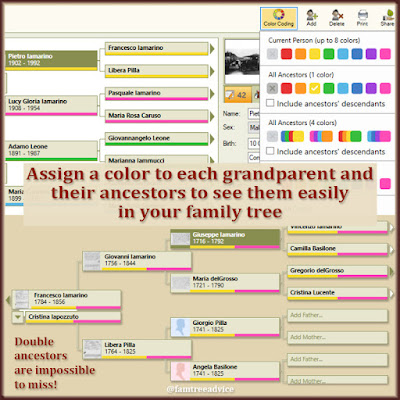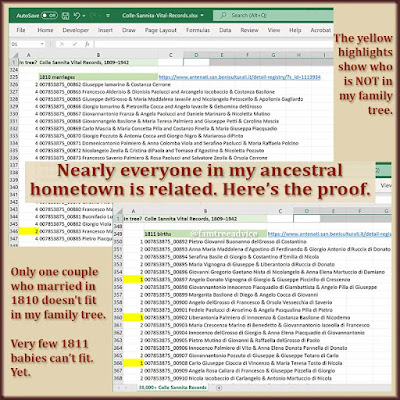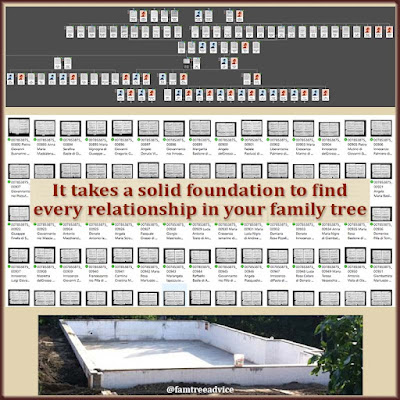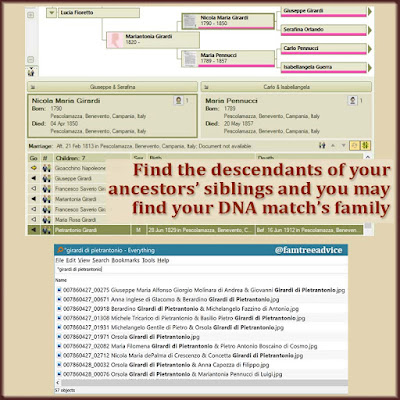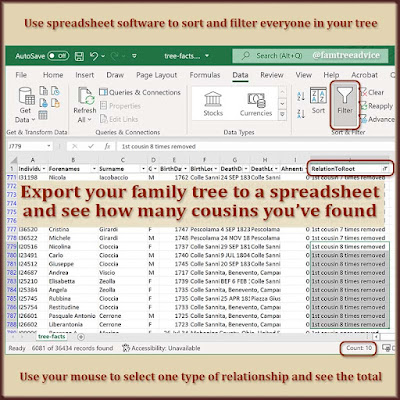Some people think seeing your DNA pie chart is a waste of time and money. When I saw my first DNA results in 2012, I'll admit, I was very disappointed. But in 10 years, the number of DNA testers and the technology used for analysis have grown.
AncestryDNA updated their DNA Communities recently. I checked the results for my parents, my husband, and me. My first thought was, "Yeah, you got that right." The communities matched exactly what I know based on the paper trail.
It's amazing to see how specific our results are as compared to 10 years ago.
Mom and I have the South Benevento & North Avellino Provinces community. That's exactly how I always describe where our ancestors came from. When I zoom into our communities on AncestryDNA, the locations of my direct ancestors begin to pop up. They form a corridor that stretches from northern Avellino up through southern Benevento. That's the cradle of my genetic matter right there.
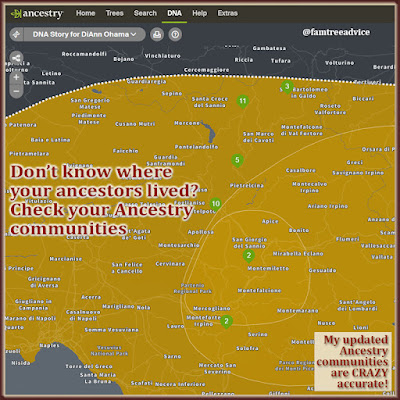 |
| The updated AncestryDNA communities are too accurate to ignore. |
This is all very nice to see. Only later did the true value of these communities hit me. What if you don't know exactly where your people came from? What if family lore tells you nothing more than a country of origin? I know that's true for so many descendants of immigrants. What if that country's borders have changed over time? How can you get anywhere in your family tree research on such slim information?
One answer is your DNA Communities. AncestryDNA compares your DNA results to those of millions of other test-takers. They form clusters of people based on your matches and your matches' matches. If your DNA matches have identified their ancestral hometowns, or if they match the population there today, it becomes clear. Your people must have come from the same area.
My husband's updated community is also very accurate. His test results have always said nothing more than 100% Japanese. That's awesome in itself, to be 100% of anything.
But his new community has the names of 5 cities, and the first 2 happen to be exactly where his family came from. His dad's side is from Hiroshima, and his mom's side is from Yamaguchi. I can verify this with his ancestors' immigration records. It's amazing that all his history, from 300 years ago to his grandparents, rests in a small slice of Japan.
And my family history is very similar. Civil records put my ancestors in that thin corridor of southern Italy since the late 1600s. Church records show my maiden name existed in my Grandpa's hometown since at least the 1400s.
Let Your Communities Narrow Your Search
Let's say your ancestor emigrated too early for their hometown to appear on a ship manifest. And you can't find any other record for them that states a specific town of birth. Check your DNA Communities! One of them may narrow down your search to a handful of towns.
In many countries, you must know your ancestor's town of birth or you may never find their records. If you can narrow down your search to a short list of towns, you may find your ancestor faster.
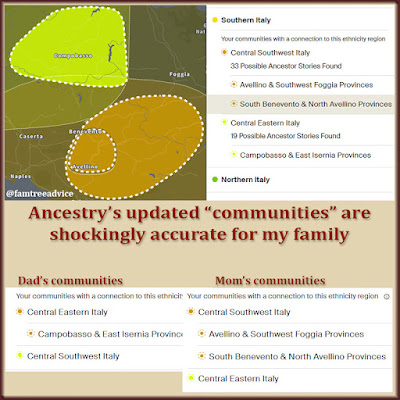 |
| If I didn't already know my ancestral hometowns, these results would have pointed the way. |
I checked my DNA results on MyHeritage, and they have what they call Genetic Groups. I have far less confidence in these groups. They're not very specific, and they include Ohio because my dad and his cousins were born there. His family had only recently moved there. My Ohio roots are very shallow.
My 2 other Genetic Groups are better than Ohio, but nowhere near as specific as AncestryDNA. They are Italy (Bari) and Italy (Campania). I know my roots are 100% in Campania, but that's an entire region of the country. That wouldn't help me find my ancestors. MyHeritage has a "Low" confidence level that I'm even from Campania!
My 23 and Me results are way off in so many ways. What they tell me would be of no use whatsoever in helping me find my ancestors. But I didn't buy their test kit. I don't know if the results would be more specific if I had.
Have you tested with AncestryDNA? Do you still have some mysteries about your places of origin? Check out your updated communities! You can even see which of your DNA matches belong in the same communities. If you haven't found your town of origin, maybe one of your closest matches has.


